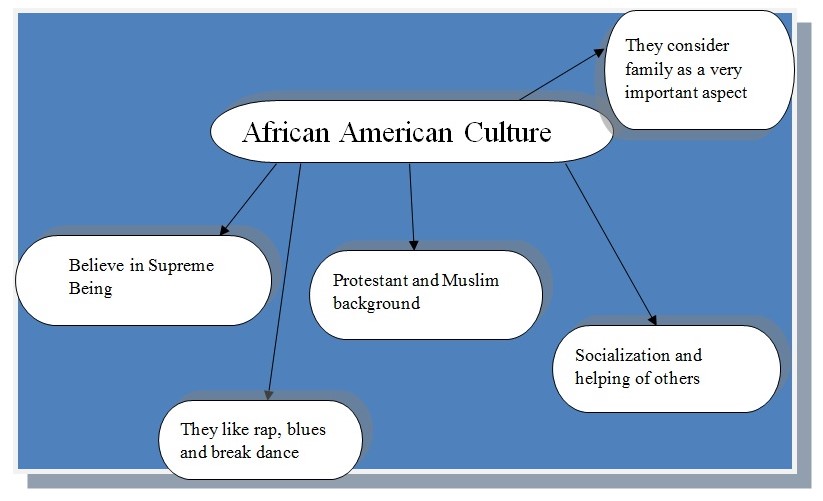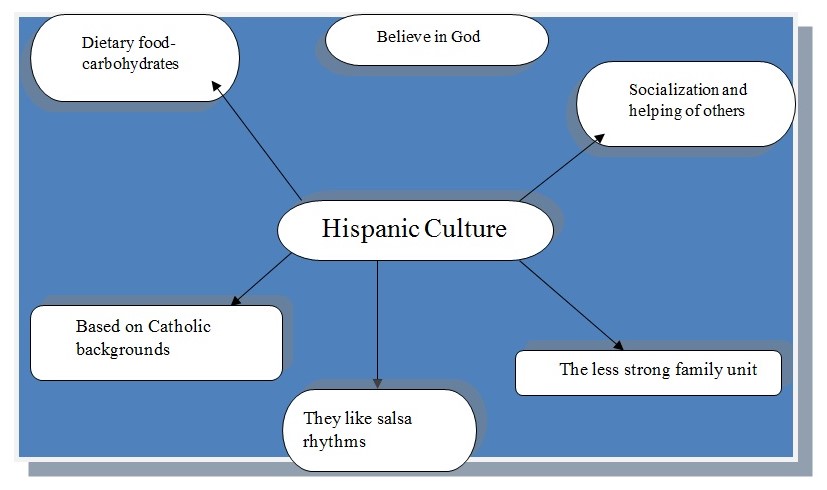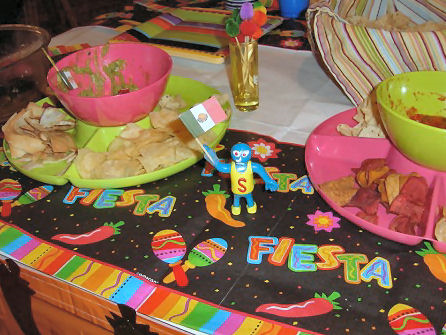Statement of Purpose for your Research
The topic of the research project is minority cultures living in my state. Identify and investigate two minority cultures prevailing in the locality with the support of various relevant analytical reports to seek out various lifestyles, values, mores, and other characteristics, finally comparing those recognized facts. The two minority groups selected for my research are African American people and Hispanic groups with whom I’m familiar from my locality.
Gathering of Sources
Primary Sources
- Academics on Hispanic culture and Health Care (2000)
- Report on Ancient and Future Catholics (2006)
- National Hispanic Heritage Month, September 15-October 15, 2009
- Hispanic Culture Review
- Celebrate African American Heritage in America’s National Parks
- African-American women weaving a rug in a home economics class at Hampton Institute, Hampton, UNITED STATES – CIRCA 1899: African-American women weaving a rug in a home economics class at Hampton Institute, Hampton, Va. (Photo by Buyenlarge/Getty Images)
Secondary Sources
- Basiotis, P. & Lino, M. (2000). “Report Card on the Diet Quality of African Americans.”Family economics and nutrition review 131(6), 60-67
- Byrd, M. (2006). Differences between Hispanics and African Americans. Journal of American culture, 21(2), 23-67.
- Collins, M., Cathleen, A. & Esquibel, K. (2006). Definitions of Health: Comparison of Hispanic and African- American Elders. Journal of American culture, 12(3), 264
- Koster, W. (2007). Minority health facts: Hispanics/Latinos in Florida. San Francisco: University of California Press. 20-34 – Secondary Source.
Conceptual Map
The images below show the variables which characterize the two cultures selected, namely African American Culture and Hispanic Culture.


Introduction & Background
The state of Florida is occupied by people of different cultures. There are dominant and minority cultures and their core values, lifestyles and other cultural practices are quite different. Minority cultures include Hispanic and African Americans among others. Hispanic culture is associated with anybody with linguistic or cultural antecedents in Spain. They are considered a monolithic group of Americans and their cultures are referred to as mosaic culture. This notion is true because there are very many Hispanic sub-groups with profound differences in their culture, origin, and ethnicity. The state of Florida and its communities have been enriched by the Hispanic culture and its history. This culture has affected the way of life in numerous ways. Collins, Cathleen, and Esquibel (2006) argued that the lifestyles of Hispanics have been adopted by other minority and majority cultures. Consequently, the culture of the whole state continues to benefit from the intellectual and cultural exchange between different people. Religion, dietary practices, and social practices are the most common features which differentiate one culture from the other. This research paper attempts to explain the core cultural practices of Hispanics and African Americans.
African American Culture
This culture came into being due to contributions of Americans of African origin whose cultural practices descend to the general culture practiced in the United States. The culture is deeply rooted in the historical experience of the African American people. This is a distinctive feature of this culture. The culture has influenced American culture in a big way. Anthropological field research reveals that African Americans have not lost cultural ties with Africa. There are continuums of African traditions as shown by Africans in the Diaspora. The African American culture continued to flourish after emancipation. There were many radical innovations in music, art, cuisine, and religion.
During ancient days, African American leaders prohibited written communication. They considered that African-based oral traditions were the best ways of preserving African history, morals, and other cultural norms. They did not rely on written words hence cultural elements were passed from generation to generation through storytelling. Storytelling and folktales were used as the primary means of inspiring and educating others. African Americans have affected the development of modern-day Florida through their great contribution to culture, education, business, and government. The vibrant cultural heritage has influenced many opportunities in the United States. Plantations have flourished due to their efforts.

“African-American women weaving rug in home economics class at Hampton Institute, Hampton, UNITED STATES – CIRCA 1899: African-American women weaving rug in home economics class at Hampton Institute, Hampton, Va. (Photo by Buyenlarge/Getty Images)” (African-American women weaving a rug in a home economics class at Hampton Institute, Hampton, Va, 1899). Basiotis & Lino (2000) pointed out that the diet and food practices of African American people reflect creative responses to racial oppression. Most of them use many agricultural products like yams, peanuts, rice, watermelon, indigo, dyes, and grits among others. They use hearty cuisine or soul food which can be easily procured through farming (p. 65).
Nowadays minorities are being recognized for their diversities and peculiarities so the same for African Americans as well. “The National Park Service has the honor of managing and preserving many areas that commemorate African American heritage” (Woodson, 2008, para.2). This explains the fact stated above.
Description of Hispanic Culture
According to Basiotis & Lino (2000), Hispanics are spreading to the whole of the state of Florida and the entire country. It is estimated that they will be the largest minority group in the 21st century. Most of these people reside in urban areas such as Providence, Pawtucket, and Central Falls. Hispanics are racially diverse and their roots include India, Europe, and Africa. Youth represents the largest part of the population which sharply contrasts with the aging US population. It is easy to distinguish Hispanics from another group of people living in the state of Florida because of their unique naming. A child is named after relatives or religious figures as their first name whereas their middle name represents the last name of the biological father. The mother’s last name becomes the last name of the child. According to Hispanic culture, wives are at discretion to keep their maiden names and add on their husbands’ names. Furthermore, Hispanic surnames are not Spanish. For instance, the founding father of Chile, presidents of Peru and Argentina were named as O’Higgins, Fujimori and Menem respectively. This unique way of giving names makes the culture very distinct.
Hispanics consider family a primary source of support. Members of the same family are closely knitted and support each other emotionally and financially. People who are related by blood can belong to the same family; a characteristic that does not feature in other cultures. In the family structure, the eldest male is mandated to head the rest of the family members and should act as a role model to the rest. Every member of the family must participate in crucial decision making unlike in other cultures where the elders are mandated to make decisions without consulting the younger people.
Hispanics have a tendency of placing utmost value on personal affairs than those of institutions. Co-operation and trust amongst individuals are the hallmark of the social structure practiced by the Hispanics. They dislike formal and impersonal structures. Young people are expected to show maximum respect to the older people and other authority figures within the society. When young persons are conversing with an elder or an authority figure, they should address them as uste.
Diet and food is also a very unique feature of the Hispanic culture. They rely so much on beans and grains as their staple food. They do not consume much of food stuffs such as proteins, leafy green vegetables, dairy products or any other diet which has protein. Hispanics eat a great deal of tropical fruits, starchy root vegetables and fruit juices. The government of US have recognized and promoted Hispanic culture with honor. “The National Register of Historic Places lists many properties significant for Hispanic Heritage.” (National hispanic heritage month September 15- October 15, 2009, para.1).

(Hispanic heritage, n.d.). The image shows their preparations for their fiesta, the festival. Indeed shows much difference from the majorities.
Similarities between African American Culture and Hispanic Culture
Koster (2007) argued that the two cultures have some common characteristics. In both cultures, people believe in a supreme being. Research study indicates that a large number of people interviewed or interrogated believe in God as determination for good health. One of the respondents from Hispanic culture said, “I go to church everyday and it is my medicine.” On the other hand, an African American respondent said, “Prayer and belief in the Lord (make you a healthy person).” In both cultures, there is a belief of helping others. They believe that helping others is the best way of defining oneself. It is interesting that both cultures prioritize this aspect. Socialization is highly valued by both cultures as they believe that all people should socialize in a friendly way. The kind of food used by both group of people are the same (p. 25).
Differences between Hispanic Culture and African American Culture
From the research study, we can identify that Hispanic religion is quite different from African American religion. Hispanic religion is based on Catholic backgrounds since their ancestors were Spaniards. This is evidenced by the fact that most of the people from this culture believed that Catholic Church was the only church that was established by Jesus Christ. On the other hand, African Americans are predominantly Protestants and Muslims. This is supported by the fact that most of them do not perform rituals and other religious externals which are performed by the Catholic Community. On family issues, Hispanic community has less strong sense of family as compared to the African American culture. Hispanics do not support the idea that family is very important in social life. In addition, both cultures have different musical songs and styles. Byrd (2006) commented that Hispanics like salsa rhythms and dance whereas African Americans favor rap, break dancing and rhythm of blues (p. 60).
Personal and Professional Relevance
The information contained in the research paper helps students in cosmopolitan institutions to understand their cultural differences. This enables them to appreciate one another; hence promote positive relationships amongst them. It helps eliminate racial discrimination that commonly affects students learning in an institution with people of different racial origins. Importantly, the project fosters national and international cohesion since people from all parts of the world are able to interact in a positive way. Professionals are able to build their knowledge about relationships between different cultures in a country.
Conclusion
The two cultures have greatly influenced all aspects of living in the state of Florida. Notably, the cultural practices by the people in this state encompass both dominant and minor cultures. This implies that minor cultures have also affected the dominant cultures in many ways.
Reference
Academics on Hispanic culture and health care (2000) – Primary Source. African-American women weaving rug in home economics class at Hampton Institute, Hampton,Va. (1899). Getty Images. Web.
Basiotis, P., & Lino, M. (2000). Report Card on the Diet Quality of African Americans. Family economics and nutrition review 131(6), pp.60-67. – Secondary Source
Byrd, M. (2006). Differences between Hispanics and African Americans. Journal of American culture 21(2), pp.23-67. – Secondary Source
Collins, M., Cathleen, A., & Esquibel, K. (2006). Definitions of health: Comparison of hispanic and African- American elders. Journal of American culture 12(3), 264 -Secondary Source.
Hispanic heritage. (n.d.). Cybraryman.com. 2010. Web.
Koster, W. (2007). Minority health facts: Hispanics/Latinos in Florida. San Francisco: University of California Press, pp.20-34 – Secondary Source.
National hispanic heritage month (2009). NPV.GOV. Web.
Report on Ancient and Future Catholics. (2006) – Primary Source.
Woodson, G.C. (2008). Celebrate African American heritages in America’s national park. National Park Service. Web.